Colorectal Cancer Case Study
VerifiedAdded on 2022/08/01
|6
|1814
|51
AI Summary
Assessment Task 1 - Case Study Edward (Ted) Williams Edward (Ted) Williams is an 82year old male who is day 4 post-operative following a bowel resection and formation of a temporary colostomy. Ted had previously had a coloscopy and biopsy that confirmed a malignant mass. He has a past medical history of; heart failure, type II diabetes melilites, obesity and gout. (BMI 37.6m2; Height 175cm; weight 115kgs) Ted is a widower and lives alone. His wife died 3 years ago following a bout of pneumonia. One year ago, Ted moved into a retirement village located in a regional area two and a half hours from the city. The retirement village is near where he lived with his wife and children until they left home. Ted has 2 grown up children, a son Christopher who lives overseas with his wife and son, and a daughter Janice who lives with her husband and 3 children in the city. While Ted lives alone, he has a partner Gwen 78, who also lives in the same retirement village as Ted. Current medica
Contribute Materials
Your contribution can guide someone’s learning journey. Share your
documents today.
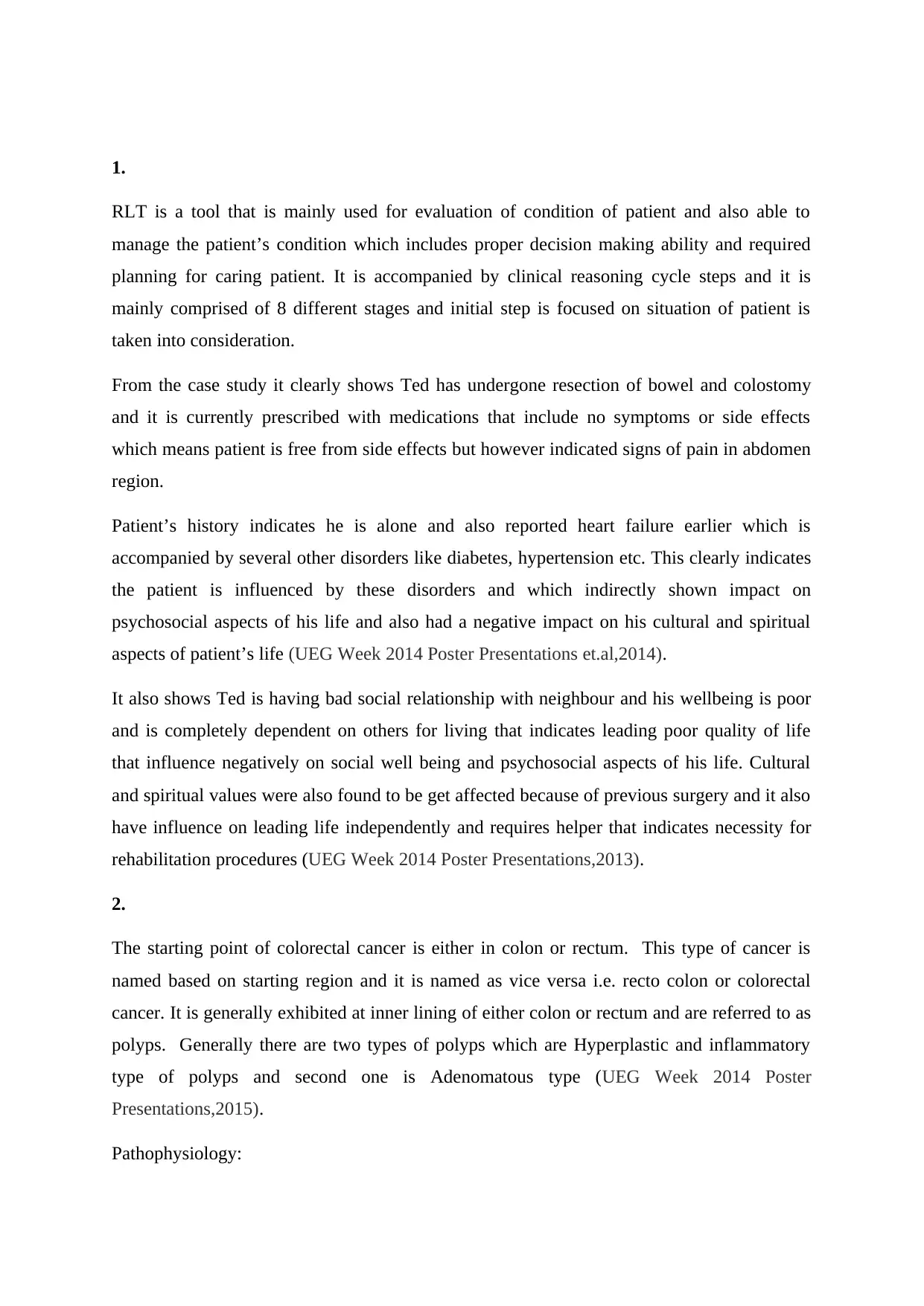
1.
RLT is a tool that is mainly used for evaluation of condition of patient and also able to
manage the patient’s condition which includes proper decision making ability and required
planning for caring patient. It is accompanied by clinical reasoning cycle steps and it is
mainly comprised of 8 different stages and initial step is focused on situation of patient is
taken into consideration.
From the case study it clearly shows Ted has undergone resection of bowel and colostomy
and it is currently prescribed with medications that include no symptoms or side effects
which means patient is free from side effects but however indicated signs of pain in abdomen
region.
Patient’s history indicates he is alone and also reported heart failure earlier which is
accompanied by several other disorders like diabetes, hypertension etc. This clearly indicates
the patient is influenced by these disorders and which indirectly shown impact on
psychosocial aspects of his life and also had a negative impact on his cultural and spiritual
aspects of patient’s life (UEG Week 2014 Poster Presentations et.al,2014).
It also shows Ted is having bad social relationship with neighbour and his wellbeing is poor
and is completely dependent on others for living that indicates leading poor quality of life
that influence negatively on social well being and psychosocial aspects of his life. Cultural
and spiritual values were also found to be get affected because of previous surgery and it also
have influence on leading life independently and requires helper that indicates necessity for
rehabilitation procedures (UEG Week 2014 Poster Presentations,2013).
2.
The starting point of colorectal cancer is either in colon or rectum. This type of cancer is
named based on starting region and it is named as vice versa i.e. recto colon or colorectal
cancer. It is generally exhibited at inner lining of either colon or rectum and are referred to as
polyps. Generally there are two types of polyps which are Hyperplastic and inflammatory
type of polyps and second one is Adenomatous type (UEG Week 2014 Poster
Presentations,2015).
Pathophysiology:
RLT is a tool that is mainly used for evaluation of condition of patient and also able to
manage the patient’s condition which includes proper decision making ability and required
planning for caring patient. It is accompanied by clinical reasoning cycle steps and it is
mainly comprised of 8 different stages and initial step is focused on situation of patient is
taken into consideration.
From the case study it clearly shows Ted has undergone resection of bowel and colostomy
and it is currently prescribed with medications that include no symptoms or side effects
which means patient is free from side effects but however indicated signs of pain in abdomen
region.
Patient’s history indicates he is alone and also reported heart failure earlier which is
accompanied by several other disorders like diabetes, hypertension etc. This clearly indicates
the patient is influenced by these disorders and which indirectly shown impact on
psychosocial aspects of his life and also had a negative impact on his cultural and spiritual
aspects of patient’s life (UEG Week 2014 Poster Presentations et.al,2014).
It also shows Ted is having bad social relationship with neighbour and his wellbeing is poor
and is completely dependent on others for living that indicates leading poor quality of life
that influence negatively on social well being and psychosocial aspects of his life. Cultural
and spiritual values were also found to be get affected because of previous surgery and it also
have influence on leading life independently and requires helper that indicates necessity for
rehabilitation procedures (UEG Week 2014 Poster Presentations,2013).
2.
The starting point of colorectal cancer is either in colon or rectum. This type of cancer is
named based on starting region and it is named as vice versa i.e. recto colon or colorectal
cancer. It is generally exhibited at inner lining of either colon or rectum and are referred to as
polyps. Generally there are two types of polyps which are Hyperplastic and inflammatory
type of polyps and second one is Adenomatous type (UEG Week 2014 Poster
Presentations,2015).
Pathophysiology:
Secure Best Marks with AI Grader
Need help grading? Try our AI Grader for instant feedback on your assignments.
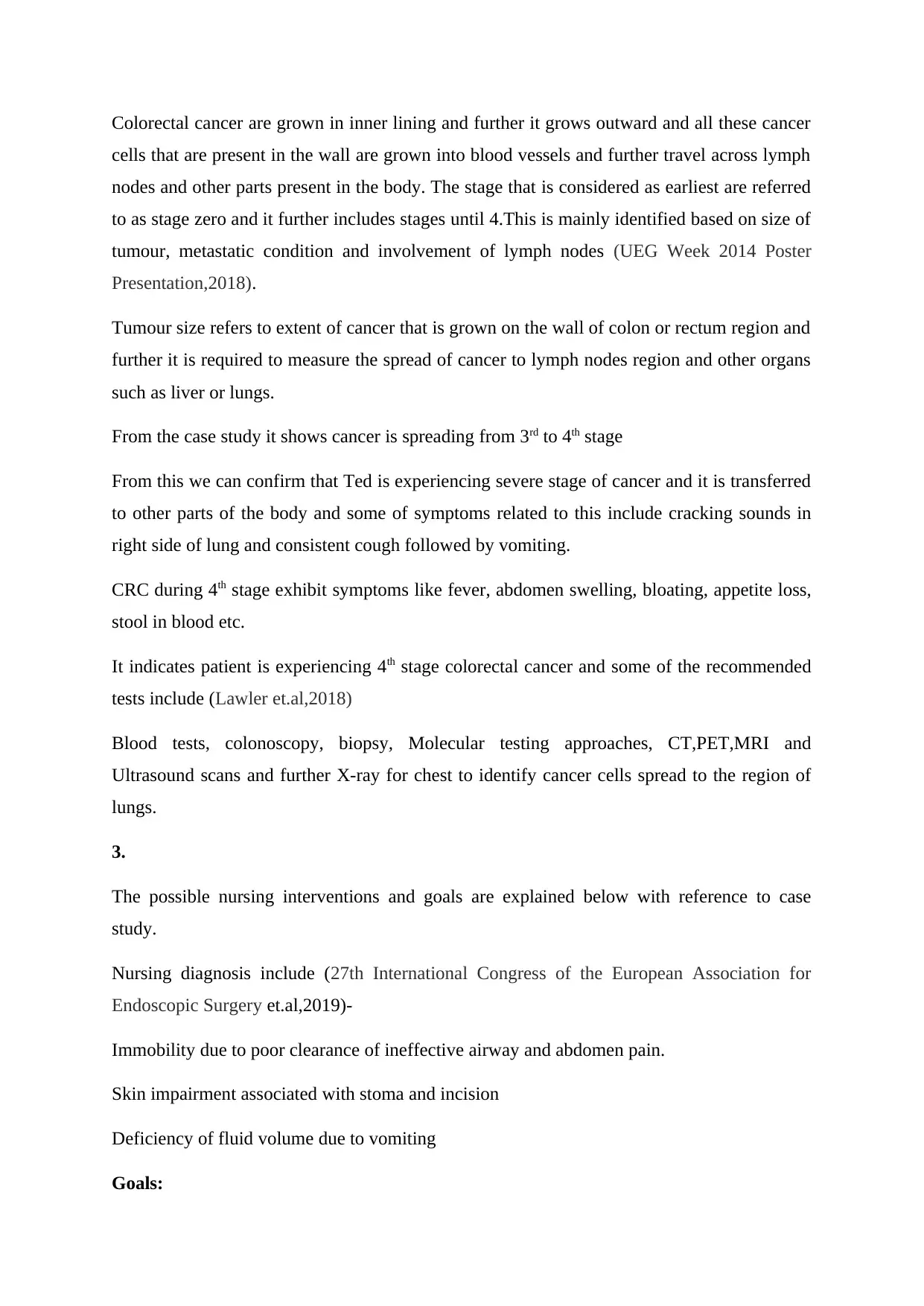
Colorectal cancer are grown in inner lining and further it grows outward and all these cancer
cells that are present in the wall are grown into blood vessels and further travel across lymph
nodes and other parts present in the body. The stage that is considered as earliest are referred
to as stage zero and it further includes stages until 4.This is mainly identified based on size of
tumour, metastatic condition and involvement of lymph nodes (UEG Week 2014 Poster
Presentation,2018).
Tumour size refers to extent of cancer that is grown on the wall of colon or rectum region and
further it is required to measure the spread of cancer to lymph nodes region and other organs
such as liver or lungs.
From the case study it shows cancer is spreading from 3rd to 4th stage
From this we can confirm that Ted is experiencing severe stage of cancer and it is transferred
to other parts of the body and some of symptoms related to this include cracking sounds in
right side of lung and consistent cough followed by vomiting.
CRC during 4th stage exhibit symptoms like fever, abdomen swelling, bloating, appetite loss,
stool in blood etc.
It indicates patient is experiencing 4th stage colorectal cancer and some of the recommended
tests include (Lawler et.al,2018)
Blood tests, colonoscopy, biopsy, Molecular testing approaches, CT,PET,MRI and
Ultrasound scans and further X-ray for chest to identify cancer cells spread to the region of
lungs.
3.
The possible nursing interventions and goals are explained below with reference to case
study.
Nursing diagnosis include (27th International Congress of the European Association for
Endoscopic Surgery et.al,2019)-
Immobility due to poor clearance of ineffective airway and abdomen pain.
Skin impairment associated with stoma and incision
Deficiency of fluid volume due to vomiting
Goals:
cells that are present in the wall are grown into blood vessels and further travel across lymph
nodes and other parts present in the body. The stage that is considered as earliest are referred
to as stage zero and it further includes stages until 4.This is mainly identified based on size of
tumour, metastatic condition and involvement of lymph nodes (UEG Week 2014 Poster
Presentation,2018).
Tumour size refers to extent of cancer that is grown on the wall of colon or rectum region and
further it is required to measure the spread of cancer to lymph nodes region and other organs
such as liver or lungs.
From the case study it shows cancer is spreading from 3rd to 4th stage
From this we can confirm that Ted is experiencing severe stage of cancer and it is transferred
to other parts of the body and some of symptoms related to this include cracking sounds in
right side of lung and consistent cough followed by vomiting.
CRC during 4th stage exhibit symptoms like fever, abdomen swelling, bloating, appetite loss,
stool in blood etc.
It indicates patient is experiencing 4th stage colorectal cancer and some of the recommended
tests include (Lawler et.al,2018)
Blood tests, colonoscopy, biopsy, Molecular testing approaches, CT,PET,MRI and
Ultrasound scans and further X-ray for chest to identify cancer cells spread to the region of
lungs.
3.
The possible nursing interventions and goals are explained below with reference to case
study.
Nursing diagnosis include (27th International Congress of the European Association for
Endoscopic Surgery et.al,2019)-
Immobility due to poor clearance of ineffective airway and abdomen pain.
Skin impairment associated with stoma and incision
Deficiency of fluid volume due to vomiting
Goals:
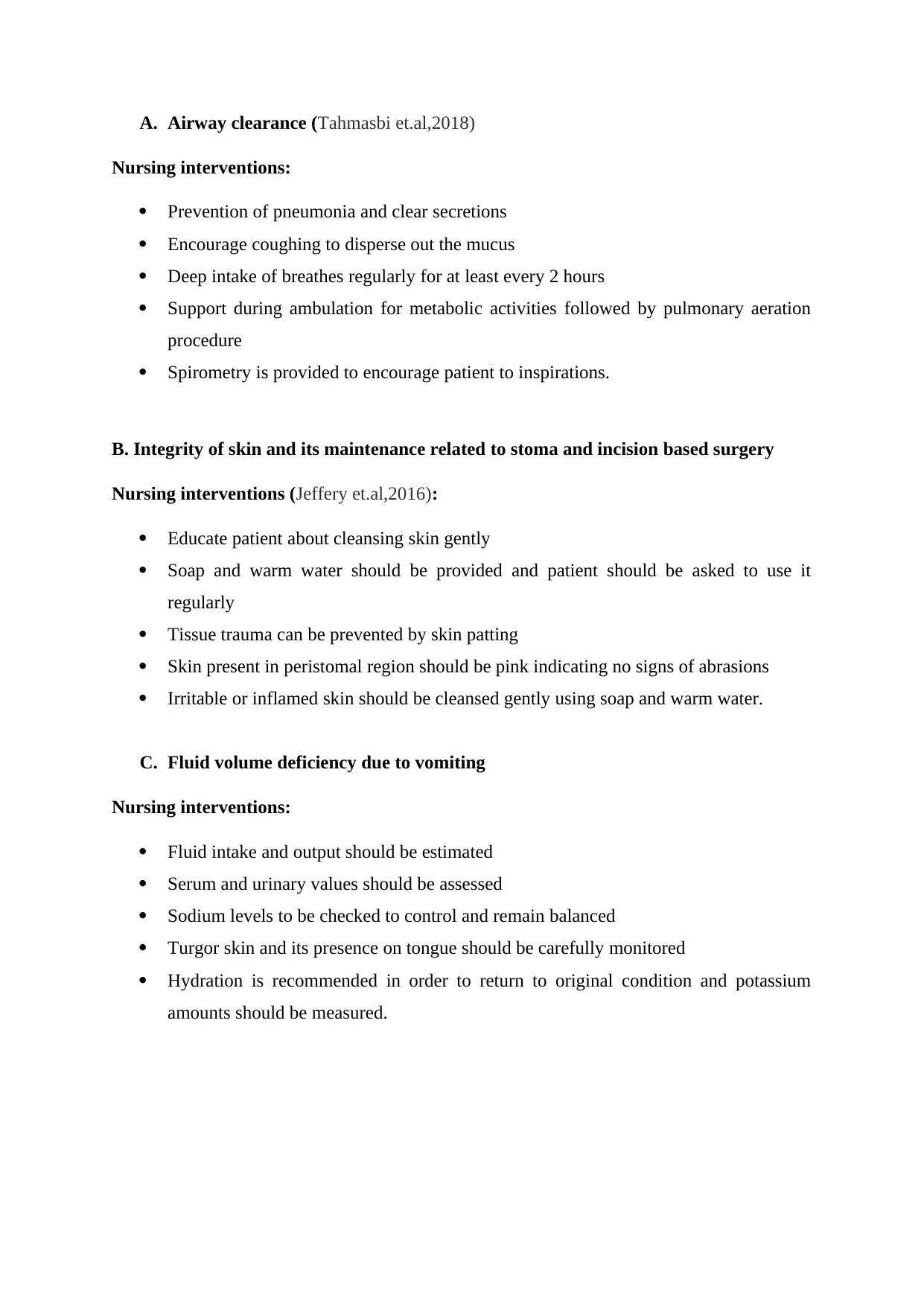
A. Airway clearance (Tahmasbi et.al,2018)
Nursing interventions:
Prevention of pneumonia and clear secretions
Encourage coughing to disperse out the mucus
Deep intake of breathes regularly for at least every 2 hours
Support during ambulation for metabolic activities followed by pulmonary aeration
procedure
Spirometry is provided to encourage patient to inspirations.
B. Integrity of skin and its maintenance related to stoma and incision based surgery
Nursing interventions (Jeffery et.al,2016):
Educate patient about cleansing skin gently
Soap and warm water should be provided and patient should be asked to use it
regularly
Tissue trauma can be prevented by skin patting
Skin present in peristomal region should be pink indicating no signs of abrasions
Irritable or inflamed skin should be cleansed gently using soap and warm water.
C. Fluid volume deficiency due to vomiting
Nursing interventions:
Fluid intake and output should be estimated
Serum and urinary values should be assessed
Sodium levels to be checked to control and remain balanced
Turgor skin and its presence on tongue should be carefully monitored
Hydration is recommended in order to return to original condition and potassium
amounts should be measured.
Nursing interventions:
Prevention of pneumonia and clear secretions
Encourage coughing to disperse out the mucus
Deep intake of breathes regularly for at least every 2 hours
Support during ambulation for metabolic activities followed by pulmonary aeration
procedure
Spirometry is provided to encourage patient to inspirations.
B. Integrity of skin and its maintenance related to stoma and incision based surgery
Nursing interventions (Jeffery et.al,2016):
Educate patient about cleansing skin gently
Soap and warm water should be provided and patient should be asked to use it
regularly
Tissue trauma can be prevented by skin patting
Skin present in peristomal region should be pink indicating no signs of abrasions
Irritable or inflamed skin should be cleansed gently using soap and warm water.
C. Fluid volume deficiency due to vomiting
Nursing interventions:
Fluid intake and output should be estimated
Serum and urinary values should be assessed
Sodium levels to be checked to control and remain balanced
Turgor skin and its presence on tongue should be carefully monitored
Hydration is recommended in order to return to original condition and potassium
amounts should be measured.
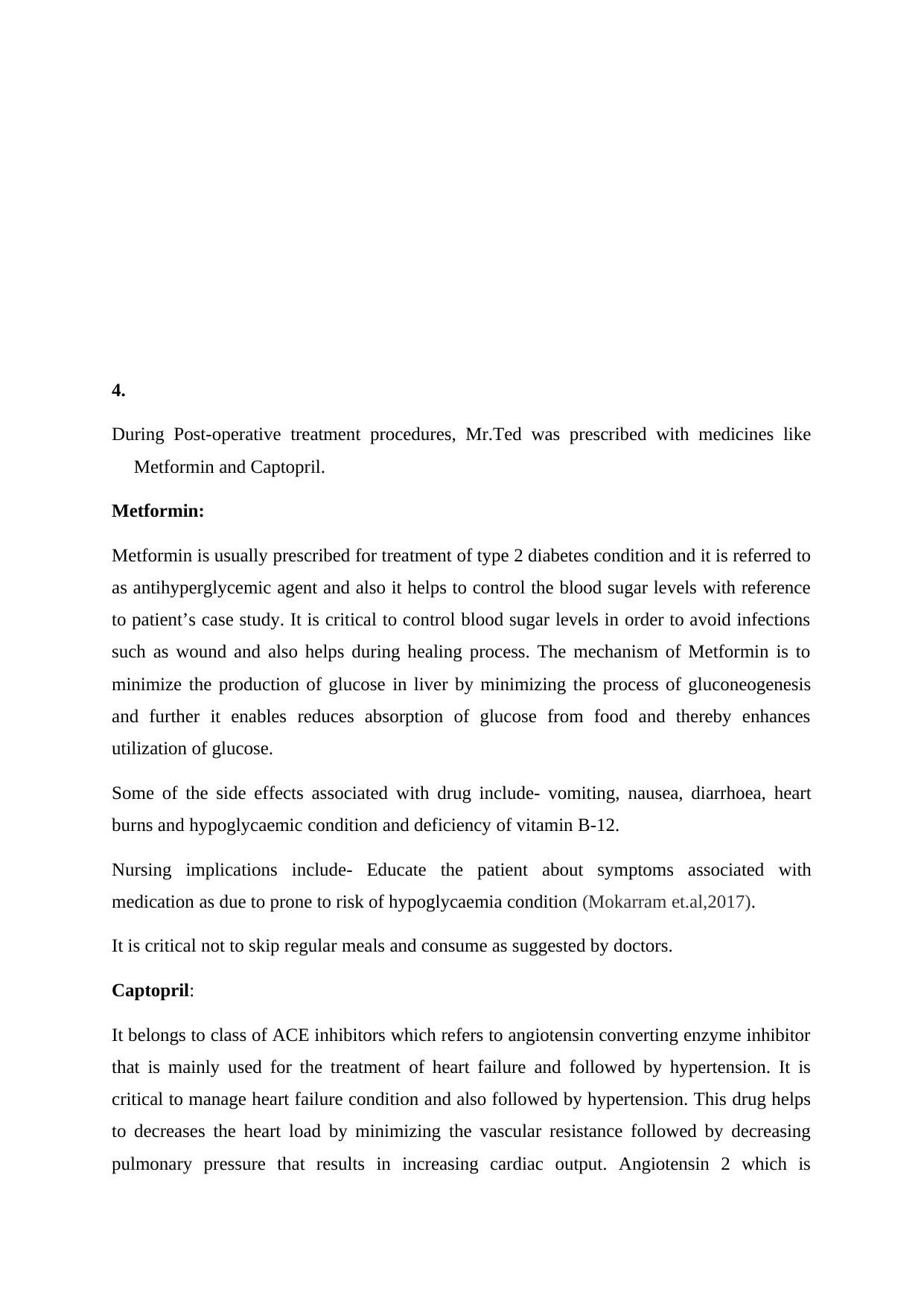
4.
During Post-operative treatment procedures, Mr.Ted was prescribed with medicines like
Metformin and Captopril.
Metformin:
Metformin is usually prescribed for treatment of type 2 diabetes condition and it is referred to
as antihyperglycemic agent and also it helps to control the blood sugar levels with reference
to patient’s case study. It is critical to control blood sugar levels in order to avoid infections
such as wound and also helps during healing process. The mechanism of Metformin is to
minimize the production of glucose in liver by minimizing the process of gluconeogenesis
and further it enables reduces absorption of glucose from food and thereby enhances
utilization of glucose.
Some of the side effects associated with drug include- vomiting, nausea, diarrhoea, heart
burns and hypoglycaemic condition and deficiency of vitamin B-12.
Nursing implications include- Educate the patient about symptoms associated with
medication as due to prone to risk of hypoglycaemia condition (Mokarram et.al,2017).
It is critical not to skip regular meals and consume as suggested by doctors.
Captopril:
It belongs to class of ACE inhibitors which refers to angiotensin converting enzyme inhibitor
that is mainly used for the treatment of heart failure and followed by hypertension. It is
critical to manage heart failure condition and also followed by hypertension. This drug helps
to decreases the heart load by minimizing the vascular resistance followed by decreasing
pulmonary pressure that results in increasing cardiac output. Angiotensin 2 which is
During Post-operative treatment procedures, Mr.Ted was prescribed with medicines like
Metformin and Captopril.
Metformin:
Metformin is usually prescribed for treatment of type 2 diabetes condition and it is referred to
as antihyperglycemic agent and also it helps to control the blood sugar levels with reference
to patient’s case study. It is critical to control blood sugar levels in order to avoid infections
such as wound and also helps during healing process. The mechanism of Metformin is to
minimize the production of glucose in liver by minimizing the process of gluconeogenesis
and further it enables reduces absorption of glucose from food and thereby enhances
utilization of glucose.
Some of the side effects associated with drug include- vomiting, nausea, diarrhoea, heart
burns and hypoglycaemic condition and deficiency of vitamin B-12.
Nursing implications include- Educate the patient about symptoms associated with
medication as due to prone to risk of hypoglycaemia condition (Mokarram et.al,2017).
It is critical not to skip regular meals and consume as suggested by doctors.
Captopril:
It belongs to class of ACE inhibitors which refers to angiotensin converting enzyme inhibitor
that is mainly used for the treatment of heart failure and followed by hypertension. It is
critical to manage heart failure condition and also followed by hypertension. This drug helps
to decreases the heart load by minimizing the vascular resistance followed by decreasing
pulmonary pressure that results in increasing cardiac output. Angiotensin 2 which is
Secure Best Marks with AI Grader
Need help grading? Try our AI Grader for instant feedback on your assignments.
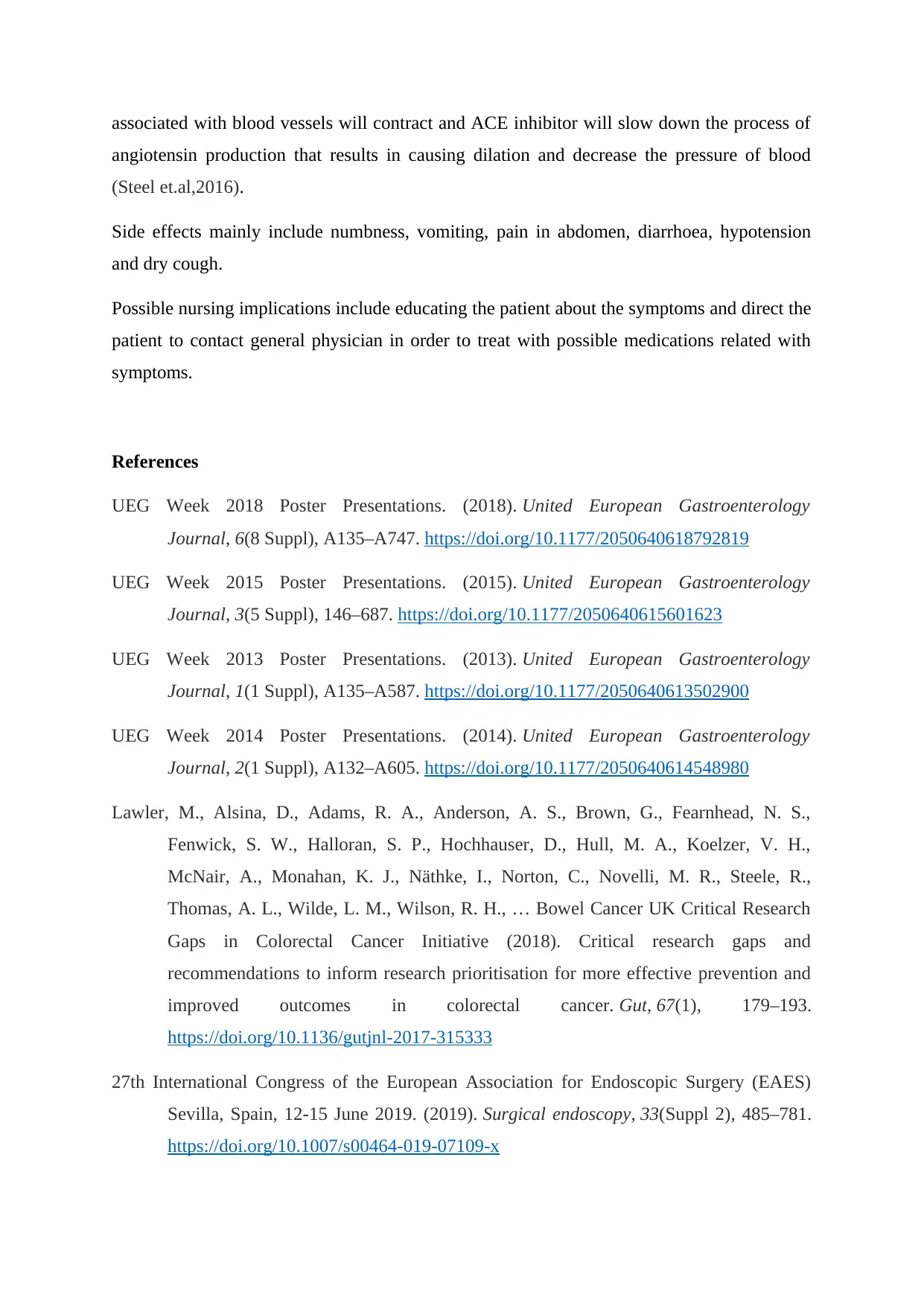
associated with blood vessels will contract and ACE inhibitor will slow down the process of
angiotensin production that results in causing dilation and decrease the pressure of blood
(Steel et.al,2016).
Side effects mainly include numbness, vomiting, pain in abdomen, diarrhoea, hypotension
and dry cough.
Possible nursing implications include educating the patient about the symptoms and direct the
patient to contact general physician in order to treat with possible medications related with
symptoms.
References
UEG Week 2018 Poster Presentations. (2018). United European Gastroenterology
Journal, 6(8 Suppl), A135–A747. https://doi.org/10.1177/2050640618792819
UEG Week 2015 Poster Presentations. (2015). United European Gastroenterology
Journal, 3(5 Suppl), 146–687. https://doi.org/10.1177/2050640615601623
UEG Week 2013 Poster Presentations. (2013). United European Gastroenterology
Journal, 1(1 Suppl), A135–A587. https://doi.org/10.1177/2050640613502900
UEG Week 2014 Poster Presentations. (2014). United European Gastroenterology
Journal, 2(1 Suppl), A132–A605. https://doi.org/10.1177/2050640614548980
Lawler, M., Alsina, D., Adams, R. A., Anderson, A. S., Brown, G., Fearnhead, N. S.,
Fenwick, S. W., Halloran, S. P., Hochhauser, D., Hull, M. A., Koelzer, V. H.,
McNair, A., Monahan, K. J., Näthke, I., Norton, C., Novelli, M. R., Steele, R.,
Thomas, A. L., Wilde, L. M., Wilson, R. H., … Bowel Cancer UK Critical Research
Gaps in Colorectal Cancer Initiative (2018). Critical research gaps and
recommendations to inform research prioritisation for more effective prevention and
improved outcomes in colorectal cancer. Gut, 67(1), 179–193.
https://doi.org/10.1136/gutjnl-2017-315333
27th International Congress of the European Association for Endoscopic Surgery (EAES)
Sevilla, Spain, 12-15 June 2019. (2019). Surgical endoscopy, 33(Suppl 2), 485–781.
https://doi.org/10.1007/s00464-019-07109-x
angiotensin production that results in causing dilation and decrease the pressure of blood
(Steel et.al,2016).
Side effects mainly include numbness, vomiting, pain in abdomen, diarrhoea, hypotension
and dry cough.
Possible nursing implications include educating the patient about the symptoms and direct the
patient to contact general physician in order to treat with possible medications related with
symptoms.
References
UEG Week 2018 Poster Presentations. (2018). United European Gastroenterology
Journal, 6(8 Suppl), A135–A747. https://doi.org/10.1177/2050640618792819
UEG Week 2015 Poster Presentations. (2015). United European Gastroenterology
Journal, 3(5 Suppl), 146–687. https://doi.org/10.1177/2050640615601623
UEG Week 2013 Poster Presentations. (2013). United European Gastroenterology
Journal, 1(1 Suppl), A135–A587. https://doi.org/10.1177/2050640613502900
UEG Week 2014 Poster Presentations. (2014). United European Gastroenterology
Journal, 2(1 Suppl), A132–A605. https://doi.org/10.1177/2050640614548980
Lawler, M., Alsina, D., Adams, R. A., Anderson, A. S., Brown, G., Fearnhead, N. S.,
Fenwick, S. W., Halloran, S. P., Hochhauser, D., Hull, M. A., Koelzer, V. H.,
McNair, A., Monahan, K. J., Näthke, I., Norton, C., Novelli, M. R., Steele, R.,
Thomas, A. L., Wilde, L. M., Wilson, R. H., … Bowel Cancer UK Critical Research
Gaps in Colorectal Cancer Initiative (2018). Critical research gaps and
recommendations to inform research prioritisation for more effective prevention and
improved outcomes in colorectal cancer. Gut, 67(1), 179–193.
https://doi.org/10.1136/gutjnl-2017-315333
27th International Congress of the European Association for Endoscopic Surgery (EAES)
Sevilla, Spain, 12-15 June 2019. (2019). Surgical endoscopy, 33(Suppl 2), 485–781.
https://doi.org/10.1007/s00464-019-07109-x
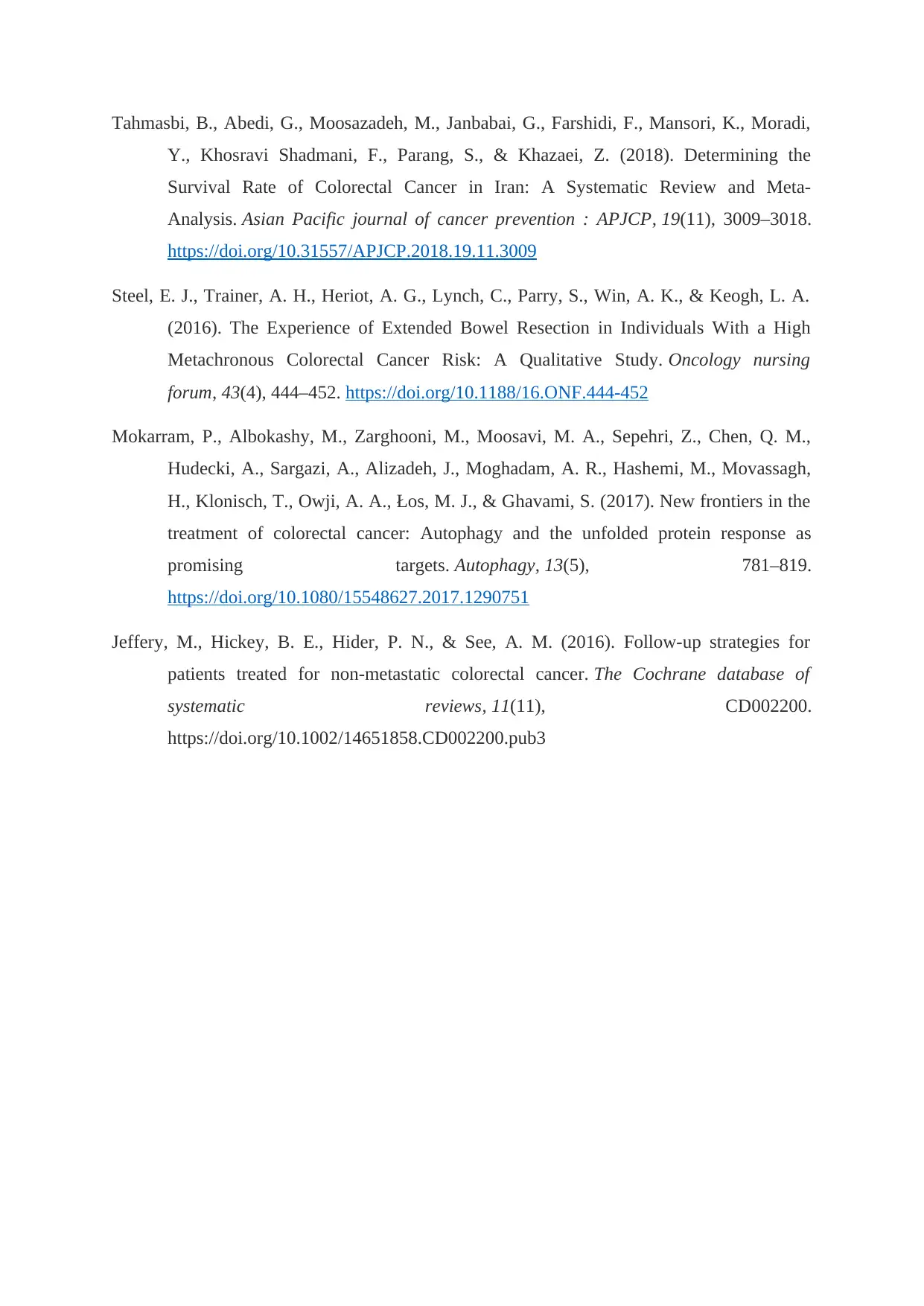
Tahmasbi, B., Abedi, G., Moosazadeh, M., Janbabai, G., Farshidi, F., Mansori, K., Moradi,
Y., Khosravi Shadmani, F., Parang, S., & Khazaei, Z. (2018). Determining the
Survival Rate of Colorectal Cancer in Iran: A Systematic Review and Meta-
Analysis. Asian Pacific journal of cancer prevention : APJCP, 19(11), 3009–3018.
https://doi.org/10.31557/APJCP.2018.19.11.3009
Steel, E. J., Trainer, A. H., Heriot, A. G., Lynch, C., Parry, S., Win, A. K., & Keogh, L. A.
(2016). The Experience of Extended Bowel Resection in Individuals With a High
Metachronous Colorectal Cancer Risk: A Qualitative Study. Oncology nursing
forum, 43(4), 444–452. https://doi.org/10.1188/16.ONF.444-452
Mokarram, P., Albokashy, M., Zarghooni, M., Moosavi, M. A., Sepehri, Z., Chen, Q. M.,
Hudecki, A., Sargazi, A., Alizadeh, J., Moghadam, A. R., Hashemi, M., Movassagh,
H., Klonisch, T., Owji, A. A., Łos, M. J., & Ghavami, S. (2017). New frontiers in the
treatment of colorectal cancer: Autophagy and the unfolded protein response as
promising targets. Autophagy, 13(5), 781–819.
https://doi.org/10.1080/15548627.2017.1290751
Jeffery, M., Hickey, B. E., Hider, P. N., & See, A. M. (2016). Follow-up strategies for
patients treated for non-metastatic colorectal cancer. The Cochrane database of
systematic reviews, 11(11), CD002200.
https://doi.org/10.1002/14651858.CD002200.pub3
Y., Khosravi Shadmani, F., Parang, S., & Khazaei, Z. (2018). Determining the
Survival Rate of Colorectal Cancer in Iran: A Systematic Review and Meta-
Analysis. Asian Pacific journal of cancer prevention : APJCP, 19(11), 3009–3018.
https://doi.org/10.31557/APJCP.2018.19.11.3009
Steel, E. J., Trainer, A. H., Heriot, A. G., Lynch, C., Parry, S., Win, A. K., & Keogh, L. A.
(2016). The Experience of Extended Bowel Resection in Individuals With a High
Metachronous Colorectal Cancer Risk: A Qualitative Study. Oncology nursing
forum, 43(4), 444–452. https://doi.org/10.1188/16.ONF.444-452
Mokarram, P., Albokashy, M., Zarghooni, M., Moosavi, M. A., Sepehri, Z., Chen, Q. M.,
Hudecki, A., Sargazi, A., Alizadeh, J., Moghadam, A. R., Hashemi, M., Movassagh,
H., Klonisch, T., Owji, A. A., Łos, M. J., & Ghavami, S. (2017). New frontiers in the
treatment of colorectal cancer: Autophagy and the unfolded protein response as
promising targets. Autophagy, 13(5), 781–819.
https://doi.org/10.1080/15548627.2017.1290751
Jeffery, M., Hickey, B. E., Hider, P. N., & See, A. M. (2016). Follow-up strategies for
patients treated for non-metastatic colorectal cancer. The Cochrane database of
systematic reviews, 11(11), CD002200.
https://doi.org/10.1002/14651858.CD002200.pub3
1 out of 6
Your All-in-One AI-Powered Toolkit for Academic Success.
+13062052269
info@desklib.com
Available 24*7 on WhatsApp / Email
![[object Object]](/_next/static/media/star-bottom.7253800d.svg)
Unlock your academic potential
© 2024 | Zucol Services PVT LTD | All rights reserved.



